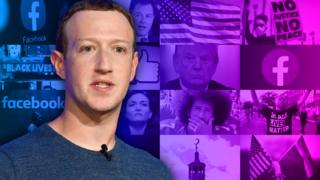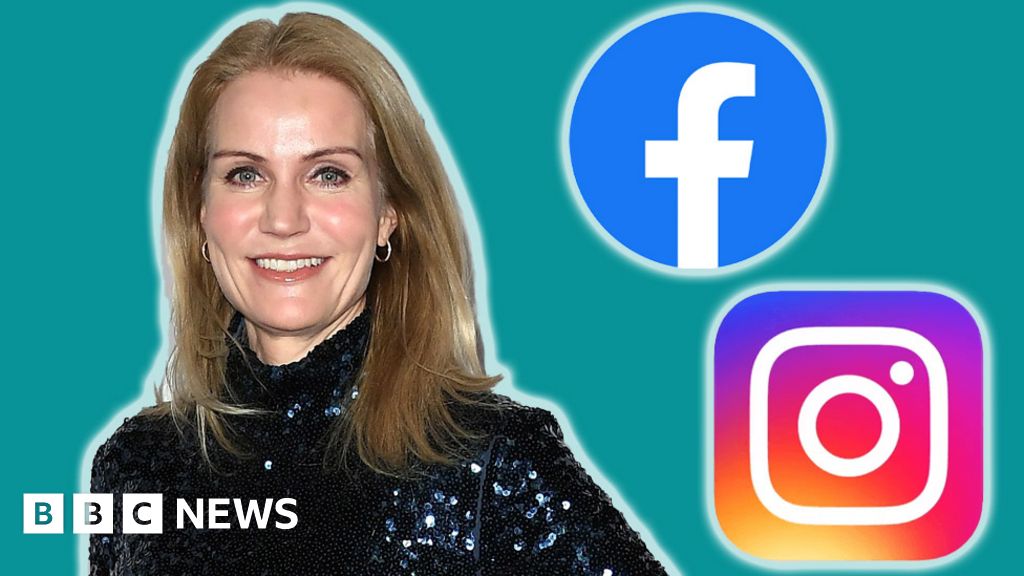 Image copyright
EPA AFP GETTY IMAGES REUTERS BBC
Image copyright
EPA AFP GETTY IMAGES REUTERS BBC
Facebook's civil-rights policy is "too reactive and piecemeal", leaving activists "frustrated and angry", an audit commissioned by the company says.
Details from a draft copy of the review, due to be published later, have been revealed by the New York Times.
Facebook has already said it will not make "every change" called for in the 100-page report.
The official count of advertisers boycotting Facebook over its policy now stands at more than 990.
Facebook commissioned the review in May 2018, a month after founder Mark Zuckerberg faced intense questioning at a congressional hearing.
"With each success, the auditors became more hopeful that Facebook would develop a more coherent and positive plan of action that demonstrated, in word and deed, the company's commitment to civil rights," it says.
"Unfortunately, in our view Facebook's approach to civil rights remains too reactive and piecemeal.
"Many in the civil rights community have become disheartened, frustrated and angry after years of engagement where they implored the company to do more to advance equality and fight discrimination, while also safeguarding free expression."
Facebook said the audit report was "the beginning of the journey, not the end".
"What has become increasingly clear is that we have a long way to go," it said.
"As hard as it has been to have our shortcomings exposed by experts, it has undoubtedly been a really important process for our company."
The auditors also referenced Facebook's decision to allow a controversial post from US President Donald Trump to remain on the platform.
"When it means that powerful politicians do not have to abide by the same rules that everyone else does, a hierarchy of speech is created that privileges certain voices over less powerful voices," the report says.
Chief operating officer Sheryl Sandberg said the audit had already had a "profound effect on our culture" and Facebook had already acted on many of its recommendations.
"While we won't be making every change they call for, we will put more of their proposals into practice soon," she said.
But organisers of the advertising boycott said a meeting with Facebook's senior management, including Ms Sandberg and Mr Zuckerberg, had been "disappointing".
"It was abundantly clear in our meeting today that Mark Zuckerberg and the Facebook team is not yet ready to address the vitriolic hate on their platform," the Stop hate for Profit group said, adding the company would not respond directly to the demands of the boycott.
And it accused Mr Zuckerberg of offering "the same old defence" society had "heard too many times before".
"Facebook wants us to accept the same old rhetoric, repackaged as a fresh response," it said.
Color of Change president Rashad Robinson also said the meeting "was a disappointment".
A bad look
Analysis
By James Clayton
North America technology reporter
This audit is grim reading for Facebook.
What makes it so significant is the report looks at whether Facebook itself is driving people towards extremism.
"Facebook should do everything in its power to prevent its tools and algorithms from driving people toward self-reinforcing echo chambers of extremism," it says.
And that is not just a criticism there is nasty stuff on the platform.
It is criticism the platform itself may drive hate.
Failure to act can have dangerous and life-threatening real-world consequences, the report says.
And it will add momentum to the Facebook ads boycott that had gone a bit quiet over the past few days.
Meanwhile, it has emerged Facebook's much-lauded oversight board will not now launch until late-autumn.
The board will be an independent body that can decide what kind of content can and cannot be on Facebook - with the power to overrule the company's own decisions.
In January, Facebook said the board would start its work "within the next few months".
The delay has prompted speculation it may not be up and running until after the US presidential election at the start of November.

 5 years ago
909
5 years ago
909 

